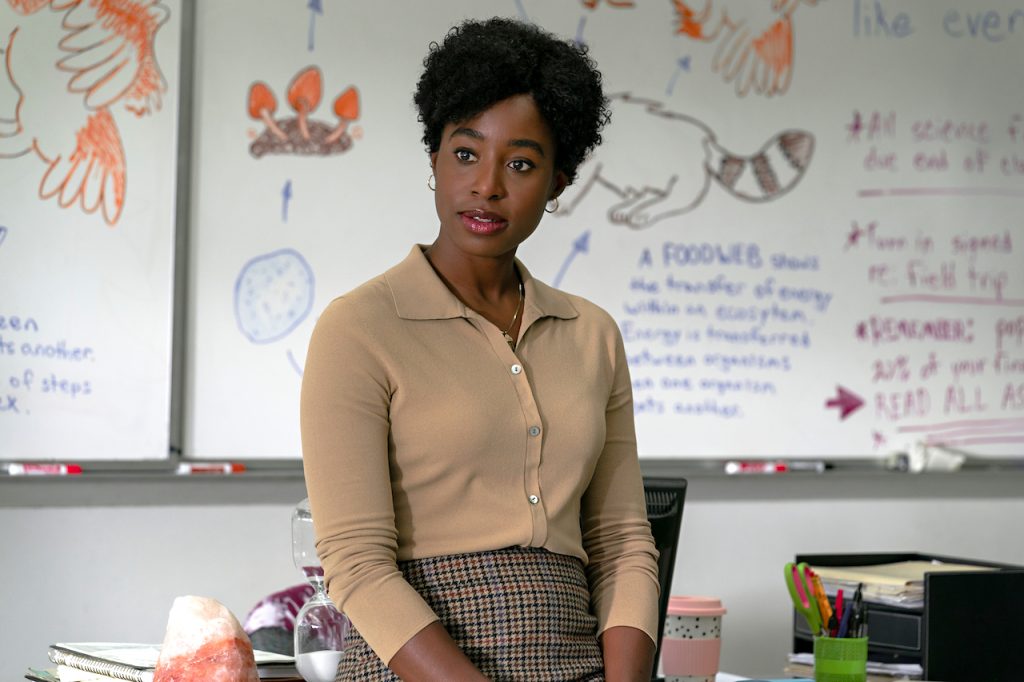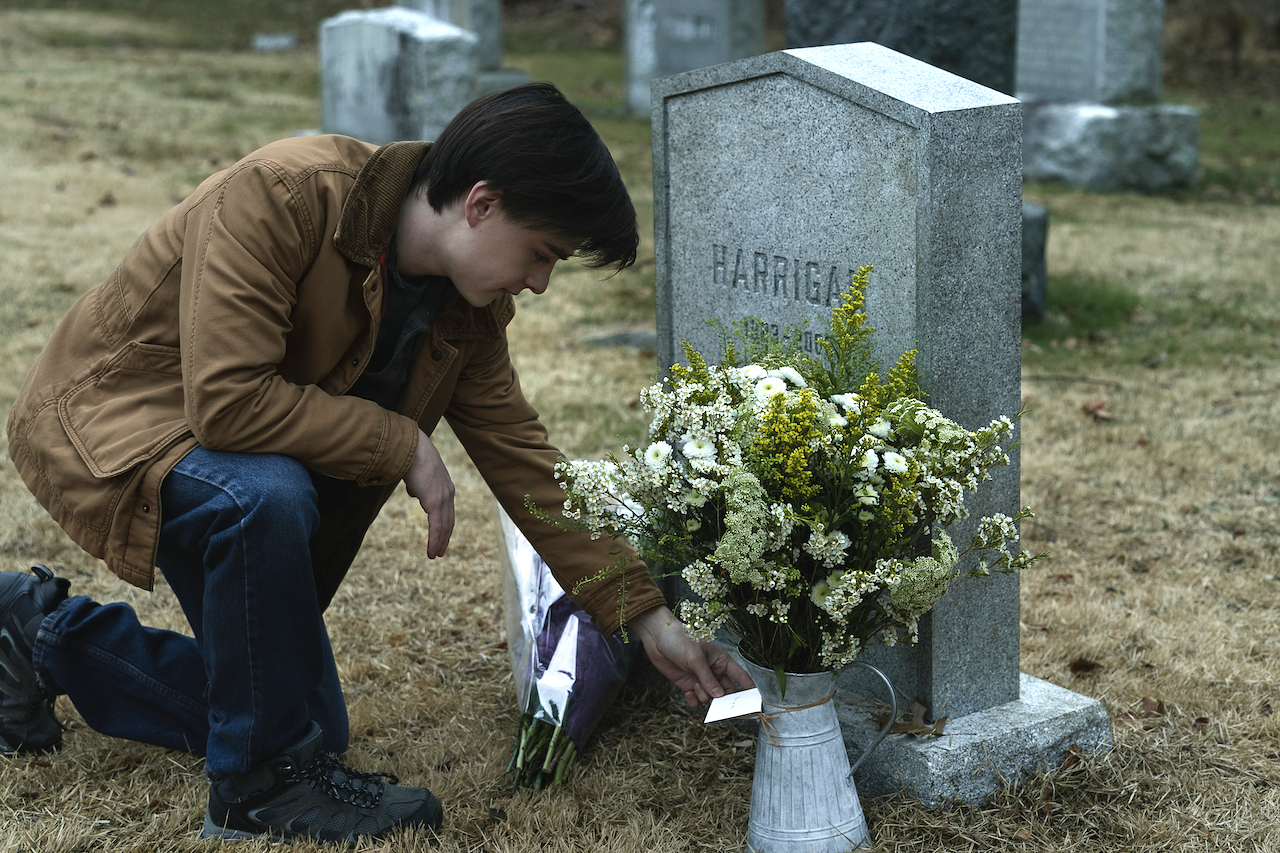This interview contains mild spoilers.
Based on Stephen King’s collection of novellas titled If It Bleeds, screenwriter John Lee Hancock (The Highwaymen, Saving Mr. Banks) expanded a story of grief and technology into the snappier-titled Mr. Harrigan’s Phone.
It all began when producer Jason Blum approached Hancock to adapt the first story in the collection called Mr. Harrigan’s Phone and made it his own. The writer’s initial response was that it was a tough adaptation, but he embraced the challenge. “I liked a lot of the themes, but there’s an opportunity to embrace what Stephen King is saying and make it fuller,” he continued.
The story had multiple suitors, so Mr. Hancock got creative and wrote a convincing letter to Stephen King. “It’s like when there are multiple offers on a house and write you a letter to the owner saying how much you love the house, the neighbourhood, and the local schools in the hopes they’ll sell you the house,” Hancock said. He didn’t offer a pitch or his take on King’s story. Instead, his letter outlined what spoke to him. “Within an hour, I got an email from Stephen which said, ‘Let’s do this.’”

John Lee Hancock
After John Lee Hancock got the green light, he started breaking down the story and explored the prevailing themes of technology. “There was also an undercurrent of characters who carry grief” which he tapped into. This is the bond that connects both Mr. Harrigan (Donald Sutherland) and Craig (Jaeden Martell) since they both lost their mothers at a young age and are trying to process their loss.
Grief doesn’t know age
Mr. Harrigan is a billionaire in his eighties living in a lonely mansion and Craig is a young boy. United through their common loss, they were probably each other’s best friend. It’s unlikely Mr. Harrigan had any other friends beyond his business associates and acquaintances. After he moved to a sleepy town, he didn’t have many visitors. “Even though Harrigan never says that, the audience feels it.” Craig and Harrigan’s friendship sets the table for what’s about to come after he dies.
Mr. Harrigan’s Phone straddles the tightly-braided themes of loneliness and grief. “I think grief leads to loneliness. They’re first cousins,” mused Hancock. Craig’s dad (Joe Tippett) is also grief-stricken and lonely after losing his wife. He doesn’t have a lot in common with Craig, but they both love each other. “It may be why Craig initially accepted the job of reading to Mr. Harrigan for a few hours a week – to escape a lonely house.” Mr. Harrigan used his grief to isolate himself and build his billions. “He leaves New York for Harlow and purchases the property with the worst view so it doesn’t attract people. There’s a sadness to it.”
The novella is told as a remembrance from Craig who is now in his twenties. “A memory that takes a paragraph to tell in the book can activate an entire scene to make it visual.” This was the challenge for John Lee Hancock to adapt it into a movie. “I wanted Craig to actively seek answers.”
The screenwriter was cognizant of the use of the cell phone as a mode of communication, but didn’t make it the exclusive focal point of his film. “I didn’t want there to be a screed against technology. My kids see some of their friends addicted to their phones and let them rule their lives.”
Mr. Harrigan becomes addicted to his new phone very quickly once he realizes its capabilities. He also realizes its dangers of too much free information, not all of it of good quality, or necessarily correct. Mr. Harrigan wisely cautions, “We don’t own things. Things own us.” Hancock saw this as an ancillary theme in the film he built out.
Start With A Quote
Mr. Harrigan’s Phone opens with a quote from Oscar Wilde, “When God wants to punish us, he answers our prayers.” This was something that John Lee added that wasn’t in the book. The book story initially opened with an overview of Harlow, Maine where it’s set. “It didn’t set the tone. I wanted the audience to sense that something else was afoot.” Hancock labored over the most appropriate quote to open his film and considered a range of quotes about grief. He finally settled on Wilde’s short quote to hint at an impending dread. “It’s essentially, ‘be careful what you wish for‘” thing.
Despite their differing ages and backgrounds, Craig and John Harrigan have a connection and have something to teach each other. “Craig teaches Harrigan what a true friend is, as does Harrigan.” They read books including Heart Of Darkness, Crime and Punishment and, The Jungle by Upton Sinclair and discuss how they apply to their lives.
Craig reads books to Harrigan several times a week over a period of years. Harrigan finally confronts Craig about why he continues to read to him. He’s a teenager now and he surely has other interests. Craig responds how much he values their time together. He’s not there out of obligation. He’s there because he wants to. This is a defining scene in which the curmudgeonly John Harrigan realizes he has a true friend. “The roles have switched from mentor to mentee.”
Harrigan has some less wholesome lessons to teach Craig. Life is a jungle. Eat or be eaten. Seek revenge against those who trespass against you.

John Harrigan (Donald Sutherland) Photo courtesy of Netflix
Mr. Harrigan’s Phone also touches on themes of power – its use and abuse. Harrigan ruthlessly wields it against anyone that crosses him, but it has cost him the joy of meaningful relationships besides Craig. Craig discovers his power to exact deadly revenge, but later decides he doesn’t want it anymore (a reference to the opening quote).
How Does The Phone Work?
The audience is never told exactly how a deceased person can text from a phone he’s been buried with, let alone how it can make vengeful wishes a reality. A lack of exposition isn’t necessarily a problem because what the phone does is more important than how it does it. “It makes no technical sense, but that’s what makes it so scary. It makes the audience think about the unknown power it has,” continued Hancock.
A lack of expositional details places both the characters and the audience in a state of unease. Consider the school bully, Kenny Yankovich (Cyrus Arnold). His death was regarded as an unfortunate accident – he fell and broke his neck. “This is conceivable, but the audience realizes there is a connection between the bullying and Kenny’s death.” It’s beyond a coincidence. Craig doesn’t realize this until later. “It not until Craig wishes Deane Whitmore’s (Daniel Reece) dead for killing Ms. Hart (Kirby Howell-Baptiste) that he senses he may be responsible.” Then he experiences pangs of guilt and remorse above his confusion.

Ms. Hart (Kirby Howell-Baptiste) Photo by Nicole Rivelli/ Netflix
“Craig is putting hits on people through Mr. Harrigan’s phone and they die by suicide in very specific ways.” John Lee Hancock doesn’t want to know how a ghost may or not kill people. “I honestly don’t know, and that’s what I like about it.” The most important thing is how it affects Craig. Both Stephen King and John Lee Hancock agreed on this approach. Mr. Harrigan’s Phone isn’t a horror story where a malevolent force must be explained.
Mr. Harrigan’s Phone is decidedly not a horror story hence the relative lack of traditional gore and jump scares. Ryan Murphy, who co-produced the film, championed the genre as “paranormal coming of age.” Javier Navarrete who composed the score for the film gave it a “cautionary fairytale” quality. This is reflected in the tone of the film which is consistent with Stephen King’s intention in his novella.
“Although Harrigan is not a horror film, there’s an uneasiness to it. It gets under your skin a little bit. You never feel completely safe. It’s not something jumping out of the closet. It’s more of an intense, deep, down under feeling,” pondered the screenwriter. The particular cinematography also enhanced the sense of being off balance. Cinematographer John Schwartzman used Rosemary’s Baby as a starting point to photograph Harrigan. “There are odd angles and lots of negative space so that it looks not quite right, making it difficult to settle into the frame.”
Both Craig and Harrigan are impacted by grief, which in turn, affects their choices. “Craig thinks of himself as a good person until the time comes when he needs to look in the mirror and ask himself that question.” Craig is going to be haunted by his actions long after he discards his cell phone. John Harrigan is more pragmatic when he expresses his good and bad sides. “He’s neither good nor bad, but he’s also good and bad,” claimed Hancock rather cryptically.
From the outset of Mr. Harrigan’s Phone, the screenwriter uses voiceover to propel his story. “If voiceover is only used to advance the plot, then it’s a crutch. If it’s used to add another layer the story, then that’s a good use of voiceover. It makes the storytelling more intimate.”
The final text message Mr. Harrigan sends Craig reads, “CCC sT.” Stephen King confirmed that the latter means “Stop,” but he didn’t elaborate what “CCC” meant. “Craig ponders the meaning of this message. Does Harrigan want Craig to stop using the phone because it’s hurting Harrigan, who was always being asked for favors, or because it was hurting Craig?” Hancock surmized that “CCC” means “Craig, Craig, Craig,” something Harrigan always told him. “I think I figured out what your text means,” concluded Craig by the film’s end. On a more esoteric level, Harrigan may be giving Craig some worldly advice, to stop taking his advice, forgive, let go, move on, and live his best life.
